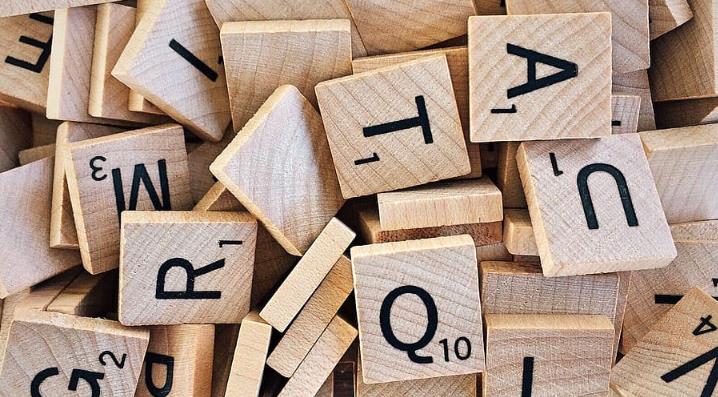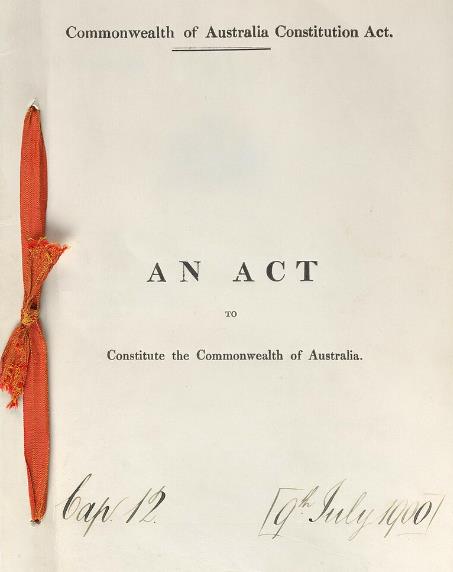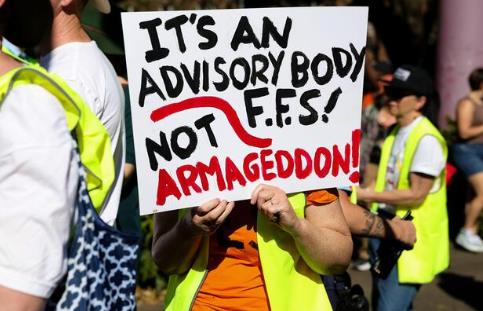The Voice. What's in a name?
For future reference: This post relates to the 2023 Aboriginal and Torres Strait Islander Voice Referendum
TL;DR: "Voice" was a poor name choice, resulting in needless uncertainty. Something comfortably familiar would have been a wiser option. Enshrining indigenous privilege in the Constitution is ok to achieve short/medium term goals, but should include a timeout. This would allay fears of long term inequity.
Had I been involved in a post-formulation review of the "Voice" initiative, I would have immediately argued for two major changes.
📜📜📜📜📜📜

The naming issue
The name "Voice" is simple, catchy, and self-descriptive.
But there are problems.
Firstly, it has a bit of an Orwellian "Ministry of Truth" dystopian-vibe to it. There is an (unintentional) authoritarian arrogance implicit in the name. As "(THE) Voice" it auto-suggests a mandated monopoly on the communications between indigenous Australians and the Australian government.
That's not the big issue. The real problem is that it is a new way of naming the type of body it ultimately seeks to be.
Naming a body "Voice" does not allow people to draw on their own experiences to understand it.
Take the issue of not providing detail of the Voice machinery prior to adding it to the Constitution. "Yes" advocates seem perfectly happy with this. As evidence for the soundness of this approach they point to the fact that there are many other government functions enshrined in the Constitution with scant or no detail about how they actually work. Taxation. Defence. Courts.
The problem with this logic is that taxation, defence, and courts are well understood. People are familiar with them and know how they function. Well understood versions of these things existed long before the Constitution was drafted. The process was not going to get mired in controversial 'machinery' debates.
People don't automatically know what a "Voice" is. We've never had a "Voice" before. The only certainty is that people will be uncertain about its workings.
Naming it the "Voice" does not allow voters to compare it with anything familiar and comfortable. This is a mistake.
In naming it, I'd be as literal and descriptive as possible.
The more I understand about how the Voice is likely to work, the more I realize it is simply a structured advocacy body. As such, its opportunities for mischief are very limited. On the other hand, it will likely have the capacity to do useful things.
To find a name I'd look at the Voice's core characteristics:
- Its purpose is to intentionally amplify the voices of ordinary indigenous Australians so that their concerns and needs are better understood.
- It needs to have permanency and continuity to work well.
- You and I are paying for it (because indigenous people don't currently have the means).
- It's a special-interests advisory body, subject to the powers of the parliament/courts just like any other group.
When I try to embody those characteristics in a name, I get something like:
The "Constitutionally Enshrined, Taxpayer Funded, Indigenous People's Lobby Group".
Yeah, I know. It's a sucky sounding name. Who cares. It's about a successful referendum, not a cute name. Australians would soon give it a nickname anyway (ie., "Digilob", "Lobbyroo", "The Voice". Whatever).
It's important to understand that this body is not "just like" any other lobby group. It will be Constitutionally enshrined, and it will be taxpayer funded. These are not small things. Which is exactly why I'd have them in the name. The various reasons for this special treatment need to be tackled head on. Either the rationale involved is good enough, or it isn't. Trying to hide these facts in the fine print is counter-productive.
Constitutionally Enshrined
There are good reasons to do this. There are also good reasons not to. I'm not going to shy away from the fact that I think that a system that gives any race of people special privileges in perpetuity is wrong. Ultimately this thing is about giving indigenous Australian a hand-up. If Constitution enshrinement is the best way of doing that, I'm Ok with it (sort of - read the "enshrinement issue" section below to understand what I mean by sort of, and why I think that).
Taxpayer-Funded
Yep. I don't like it any more than you do. But reality is reality. Regardless of the reasons, and who is or isn't to blame, we have a large number of disadvantaged Aboriginals in this country. This already comes with big costs. Investing money to solve problems can be good economics. There can't be infinite blank cheques, but if we are going to try something new, we're going to have to reach into our pockets.
You might think that labelling a special-interests lobby group "taxpayer-funded" would be the kiss of death. In this case, I'd argue that it would allow the "high minded and good willed"1 to bestow the redemptive largesse they seem to need.
Indigenous-People's Lobby Group
Calling it an "Indigenous People's Lobby Group" both accurately describes the Voice, and also pulls it back into the realm of the familiar. Nobody is worried about a "lobby group". We already have squillions of these. People know how they operate, and what they do. Most importantly, people know they aren't some sort of scary new imposition that will automatically impinge on their rights.
📜📜📜📜📜📜

The Constitutional enshrinement issue
There is this odd thing I have heard a couple of times now. Supposedly, it's not racist to create a special privilege for Aboriginals in the Constitution. This is because the privilege is created based on indigeneity, not race. I have major difficulties with this argument. Ultimately, I don't think it's relevant. Giving or removing privilege in a way that is solely dependent on some non-meritorious, hereditary-characteristic that permanently excludes other Australians, is highly problematic.
Despite that, I see benefits to Constitutional protection in the specific case of this referendum.
This is about a fair go. In this case the focus is on Aboriginals, however the principle is the same for all Australians.
It is not about wrongs of the past. It is logically absurd to accept responsibility for injustices that occurred in past generations. Nor should the same events be used as cover to avoid responsibility for taking positive action today.
A fair go is about the future. We shouldn't minimize or refuse to acknowledge past conflict. Empathetically, we should use this understanding to identify, understand, and empower those who have inherited disadvantage.
Though it's right to help people (particularly those in situations not of their own making), it's wrong to enable non-sustainable solutions in ways that simply kick the can down the road.
The fears of people who worry about enshrining permanent inequity in our Constitution could be allayed quite simply. An automatic kill switch on the particular amendment would ensure that the proposed solution is allowed sufficient time to work, while also protecting the long-term egalitarianism of future Australians.
The amendment could be set to automatically time-out after a predefined period. This could be a set time (say 20, 30, or 50 years), a specific number of parliamentary terms, or be linked to independent indicators of social equality (life expectancy, income, incarceration rates etc).
📜📜📜📜📜📜

Conclusion
Most Australians agree with the principle of a level playing field. There are justifiable fears that the Voice won't deliver that. Some part of this must be attributed to needless uncertainty about what it actually is. Others believe it could work, but will then leave (otherwise-equal) citizens unequal under the Constitution.
Aboriginals would benefit from having a strong lobby group at the Federal level, representing all indigenous interests. In my view the 2023 Referendum would be better positioned for success had wiser choices been made regarding the name, and the nature of Constitutional enshrinement. Though these changes seem almost trivial, they would have had an outsized impact.
I won't pretend that these are the only failings of the Voice initiative, or the attendant "Yes" campaign. However, getting these two simple things correct would bed down many concerns.
If the 2023 Referendum defies the odds and succeeds, this conjecture will be proved irrelevant.
If it fails, there will be the inevitable distribution of blame. Certainly the "No" camp will shoulder some responsibility. In my view, however, future initiatives would greatly benefit from a clear-eyed analysis of certain questionable choices made whilst engineering and marketing the Voice.
🧍🏼♂️🧍🏻♂️🧍♂️🧍🏽♂️🧍🏾♂️🧍🏿♂️
Peter Sutton Jun 12, 2021 Good Weekend Talks. 4m12s.↩